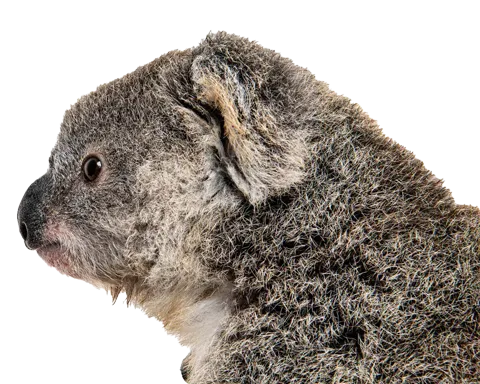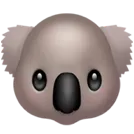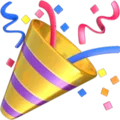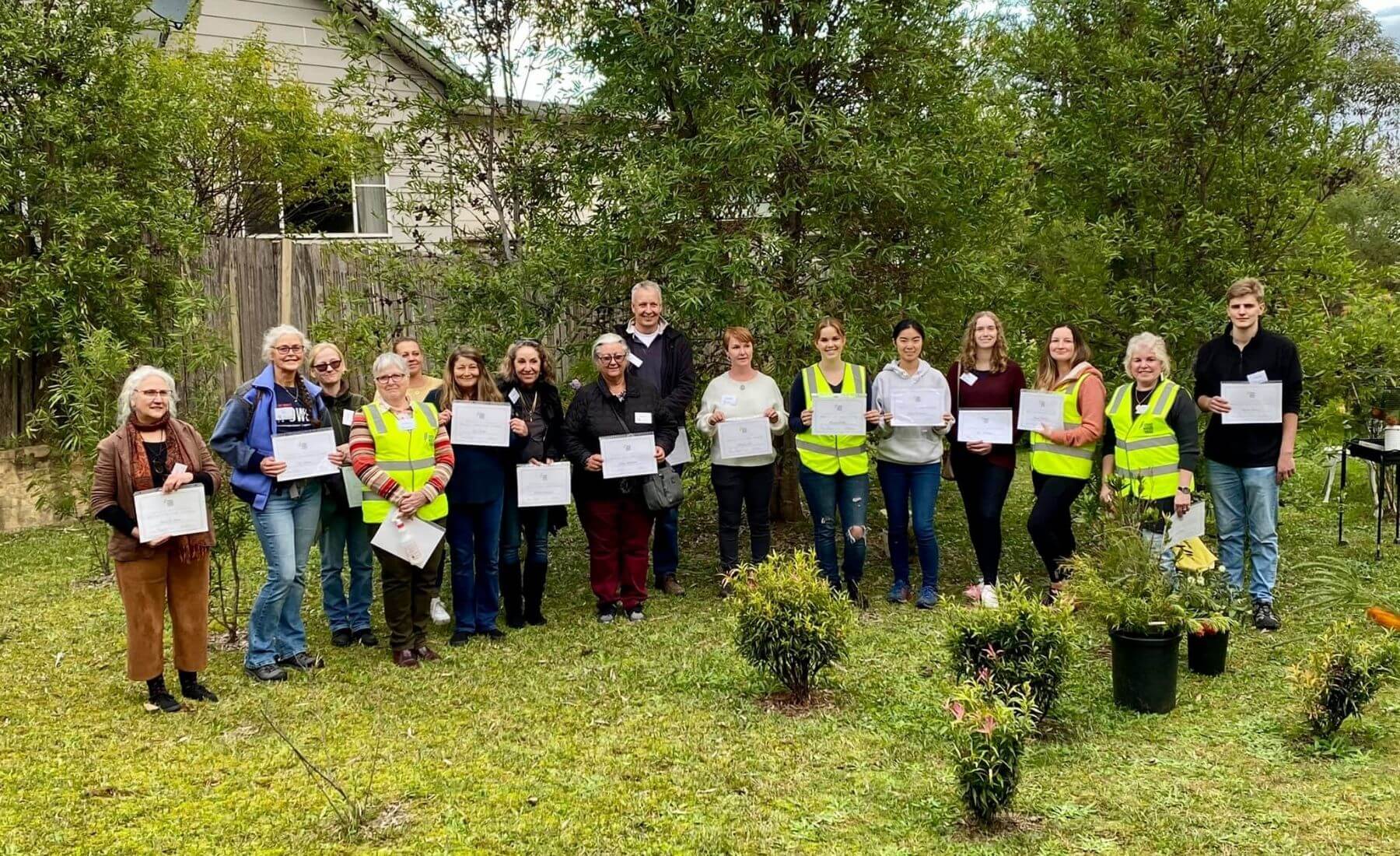
Like many progressive organisations, and after an amazing amount of developmental work from the training committee and species coordinators, the course was offered online for the first time in 2021.
Conducted over three weeks from 17 April to 3 May, the self-paced course with soft-copy manuals and educational videos included 10 modules covering an introduction to Sydney Wildlife Rescue, possums, lizards & turtles, birds, self-care and your first rescue.
After successfully completing the online component, trainees attended a practical afternoon where they received instruction in basic elements of wildlife handling and cage setup from experienced species coordinators before receiving their graduation certificates and rescue baskets.
There were 57 graduates across five districts (Northern 18, South West 15, Northern Beaches 11, Central 10 and North West 3) who have been in the field for six months now. We asked two new volunteers from Northern District’s Class of 2021 to share their training experience.
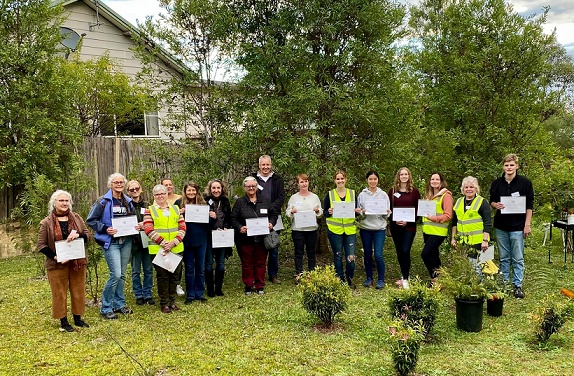
Sydney Wildlife Rescue’s online Rescue and Care Course Northern District graduates at Mount Kuring-gai 23 May 2021 (Photo: Sonja Elwood)
“She took me under her wing and showed me the animals she had in care, and we collected foliage together which gave me a greater appreciation of native wildlife, so I’ve always wanted to be involved.”
A few years later in 2014, Georgia completed work experience at a local vet, resulting in her working as a casual animal attendant for two years from 2015. Now she’s studying nursing at university, having just completed a placement while juggling work at a dental practice and her new role as a Sydney Wildlife Rescue volunteer.
While Georgia admits she struggled a bit without face-to-face learning at the start of the online course, it suited her busy work/study schedule. The three-week program also gave her valuable time for revision which she wouldn’t have in a weekend course.
Georgia loved the half-day practical session hosted at species coordinator Gillian Marcham’s property at Mount Kuring-gai.
“The experienced members answered all our questions and helped us with basic animal handling and cage setup.”
Her first callout for a Ringtail possum in a bookshelf ended up being the biggest Brushtail she’d ever seen in her life!
“It was running around the room and bouncing off the walls. The MOP (Member of the Public) was lovely and left me alone for half an hour to contain the possum.”
After a call to her buddy, species coordinator and a ‘bathroom floor test’, the big Brushie was given the all-clear and released near the MOP’s home just after dark.
So, Georgia’s motto is “be prepared”!
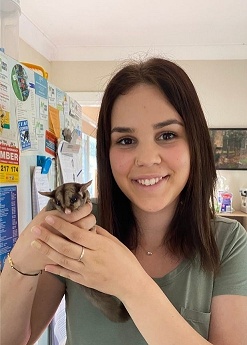
Georgia Pallas with Sugar Glider (Photo: Jane Sleap)
She describes the ongoing support from her Sydney Wildlife mentor and species coordinators as “invaluable”.
“I’m on the phone straight away to a species coordinator if I need advice, and they are always so helpful. Jane Sleap, Liz Olsson as well as quite a few other members have been amazing.”
“And I call my buddy Glenda Clark every few days to catch up and do some foliage collection for her and debrief after I do a rescue.”
Georgia’s local vets have also been so helpful. She describes this as a two-way street with them providing care and support while willing to learn from experienced carers about dosage changes from domestic animals to wild animals. She looks forward to more opportunities to work with them post COVID-19.
Sydney Wildlife Rescue HQ at Lane Cove National Park has also played an important role in Georgia’s ongoing training. When she drops in to collect animal food and supplies, Georgia chats with the amazing volunteers on the phones who share their rescue and care tips.
Georgia’s also joined some of Northern District’s monthly meetings via Zoom and enjoys the education sessions and hearing what’s going on in the organisation.
The highlight of her experience since graduating is the interest MOPs show in our native wildlife.
“They want to learn more, volunteer in the future, and genuinely care for animals. They often check in while she’s working on the rescue line to see how animals are going. They are so appreciative of what we do for native animals, and it’s lovely when they make a donation.”
Georgia’s already completed her venomous snake course. While she was nervous at the start of the day the instructors were so knowledgeable and the course was run so well and safely, she feels confident popping Pythons, Red-bellied Black snakes and Tiger snakes in a bag.
Georgia Pallas learning to handle snakes (Photo: Michael Quinnell)
She’s also completed the baby possum course online component and is looking forward to the practical component when COVID-19 permits. If you’re thinking about enrolling in the first online course of 2022, Georgia says JUST DO IT!
“It’s super flexible and you can do as little or as much as you want. Online learning makes it quite easy, and the practical session ties it all together. Whether you volunteer in the office once a month or do patient transport, all members are valued and help our native animals.”
She reached out to Sydney Wildlife and asked to be connected with a local carer so she could pass on her creations directly, which is when she met Northern District’s Macropod coordinator Jane Sleap.
“Jane told me all about the work of Sydney Wildlife and her experiences looking after these beautiful native animals, so I decided to enquire about the next rescue and care course and asked to be placed on the wait list.”
Elizabeth found the online course packed full of information and a great resource she often refers to – especially the videos demonstrating particular subjects. She also felt the practical day was well organised, particularly learning about cage setup for various species. While the species coordinators are Elizabeth’s first point of contact, she says having the added support of a buddy, if needed, just gives her that added confidence that all is going well. Elizabeth’s already been active in the field.
“My first collect from a vet and take home was ‘Beefcake’, a beautiful big Crimson Rosella boy. He had a problem with his wing and couldn’t fly. It is believed he collided with a glass panel. After a couple of weeks and a successful flight test, I contacted the MOP and went to her property for release. He sure looked pleased to be home.”
‘Beefcake’ the Crimson Rosella (Photo: Elizabeth Bellingham)
“I’ve also had a number of possum hand offs for soft release from my aviary. So, while Jane and other carers did all the hard work, I really loved having the Brushtails ‘Felix’, ‘Bindi’ and ‘Cupcake’ and Ringtail ‘Amy’ here although their care requirements were minimal. I still see them from time to time.”
Like Georgia, Elizabeth has found her local vets very helpful and has also completed the online component of the baby possum course. The highlight of her Sydney Wildlife experience to date has been watching ‘Felix’ the Brushtail grow into a beautiful big boy. If you’re considering becoming a Sydney Wildlife Rescue volunteer, Elizabeth says GO FOR IT!
“If you love animals, you’ll get up close to wildlife and m_ake a difference.”_
‘Felix’ the Brushtail possum (Photo: Elizabeth Bellingham)
So, after reading new recruits Georgia and Elizabeth’s inspiring stories, what are you waiting for? Or perhaps you’re an existing volunteer who could reach out to a prospective new volunteer? Information on the next online Sydney Wildlife Rescue and Care Course on 4 June 2022 is available on the following link: https://www.sydneywildlife.org.au/become-a-volunteer
